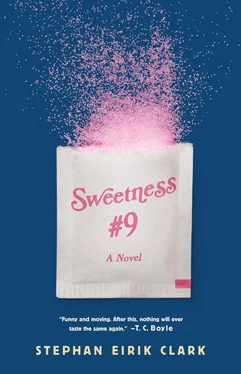I leaned into my lit magnifying glass and painted food specks onto his half apron, but I couldn’t concentrate. I’d laid a piece of newspaper down on the workbench to absorb any stray splashes of paint, and the article facing me said the consumption of fresh fruits and vegetables had plummeted in the last ten years. Apples were down 72 percent, cabbages 65, and fresh potatoes a distressing 74 points. Seventy-four? Was that even possible? I half wished I subscribed to Pravda instead of the Times. At least then I could expect something more promising than the truth. Teen suicide is down 30 percent since 1980.…Sugar has stopped accounting for 23 percent of a teenager’s calories.…More than one-third of all meals are no longer consumed away from the home.
I pushed the magnifying glass away and set my metal figurine down, unable to forget what Priscilla had told me. Could I really be responsible for the weight of those missionaries? When I’d started on as a flavorist, there had been seven thousand products on the shelves of the average supermarket — ten times the number that could have been found in the dry goods store that employed a young Abraham Lincoln, but not even half of what you could find today. We’d come so far! I’d thought. But now I wasn’t so sure that all of the distance between the past and the present represented progress alone.
I reached into my bag of potato chips, though they weren’t exactly potato chips, at least not to my mind. They were pepperoni pizza — flavored potato chips, chips that left you with no memory of the potato. Flavor chemists no longer pursued the Platonic Ideal, the perfect potato chip, the one chip that could unite us all. Now we developed an endless variety of flavorings — Sweet Maui Onion, Dill Pickle, Chesapeake Crab — so that everyone would be able to find that one chip developed just for them, an essentially American promise.
I ate slowly, quietly, softening each chip with the moisture of my saliva, thinking again of what I’d said to my daughter about Communism. Communism had always been the bulwark that had pushed back against our excesses, but since Gorbachev had given way to Yeltsin and Yeltsin had given way to too much drink, there were no more proxy wars in Africa, Asia, or Central America, no more grand global efforts to challenge our methods and suggest a better way. Now, the only turf battles were between PepsiCo and Coca-Cola, and even KFC and Long John Silver’s had joined forces together under one roof. It was just us now, and were we rising toward our greatest potential or sinking under the weight of our worst inclinations?
I pictured those Mormons walking through the supermarket and turning down an aisle lined by an infinite variety of potato chips. There was Barbecue and St. Louis Barbecue and Baby Back Ribs, there was Sour Cream and Onion and Salt and Vinegar, Cheddar Cheese and White Cheddar, and chips that were popped and baked and made out of sweet potatoes and beets. Did you blame a man for blowing himself up while crossing a minefield? Because isn’t that what the supermarket had become? A minefield? Down every aisle those Mormons would find a flavor engineered just for them, a temptation as undeniable as it was artful. So of course they were amongst the growing class of the obese. It wasn’t just the fall of Communism that had done it. We were all of us human and weak, born to succumb to our impulses and desires, and what if not desire had we been perfecting for the last ten years or more?
When I went back indoors that night, I found Ernest brushing his teeth in the bathroom off the hallway.
“Jeremiah gone?”
He nodded, moving his toothbrush from one side of his mouth to another.
I checked my watch — just after eight o’clock. “Little early to be brushing your teeth, isn’t it?”
He shrugged, a pink foam building up at the corners of his mouth. When I was a child, I’d used baking soda or a colorless toothpaste with nothing more than fluoride added to it. My life had been so bland by comparison. Breakfast had been beans and toast, a bowl of shredded wheat, or maybe the viscous yellow of a soft-boiled egg. Lunch was prepared at school beneath a canopy of steam, and dinner — a reliably narrow band of colors served up at home: green vegetable, pink meat, white potato, all chased with a glass of thick milk.
I looked to the tub and shower behind him. The curtain was pulled back to expose the blue bar of soap and the bottle of red shampoo. My son’s world was a world of bold primary colors, always enthusiastic, never in doubt. If Ernest got sick, he drank a pink liquid as thick as motor oil that tasted of bubble gum or candy apple, not one of the wincing spoonfuls of bitter goo that my mother had delivered to me.
I watched him spit a foamy pink streak into the sink, rinse and spit again, then gulp some water and apply a second telegenic curl of toothpaste to his brush.
“Another go? Dr. Levinson’s going to love this.”
He spoke around the brush in his mouth. “Good flavor.”
He was quicker this time — sucking on the brush, letting the paste wash across his tongue; then he was spitting, rinsing, and putting his neck gear into place. I stopped him at the door and gave him a kiss on top of his head; then he sauntered off toward his room. After his bedroom door had closed behind him, I reached for his tube of toothpaste and held the list of ingredients up toward the light. Fourth over from the left, alongside Red Dye No. 40, there it was: Sweetness #9.
Only filling orders. Was I really no better than a Nazi?
I lay awake considering the question long after Betty had fallen asleep beside me. Then I walked downstairs and opened my son’s door, just to watch him sleep. I’d done this hundreds of times before, though rarely since he’d entered grade school. Tonight he was curled up on his side in a ninja pose, his arms and legs scissored out in front of him, the sheets kicked free.
I stepped into the room and picked up the glass from his computer desk. There was a little juice left at the bottom, the red dye visible, a thick and bloody residue. I set the glass down, wondering if it really was as simple as my grandmother had claimed: You are what you eat. Food enters your stomach, after all, and moves into the digestive tract, where the nutrients it provides are absorbed through the walls of your intestines; then everything’s flushed round through the bloodstream and on up to your head, where only the permeable blood-brain barrier separates what you’ve ingested from the 100 billion or so neurons that control your endocrine and nervous systems. It’s here, in the 100 trillion synaptic connections that bridge these neurons, that chemical signals fire in the dark, forming all of your perceptions and thoughts, the very driving agents of our shadowy lives. And are these perceptions and thoughts stable? Can we ever say this is who I am, this is my character, this is Ernest Leveraux? Or does it change every day, hour, or minute, depending on your diet and whatever happens to pass through your bloodstream?
I brushed my son’s hair from his face and watched his eyelids flutter as he dreamed. Such an innocent, good-looking boy, the type of child I could imagine in the Sunday paper, modeling a Mickey Mouse T-shirt for a local department store; and yet no matter how familiar he looked, I feared I’d already let him drift away, that I’d never truly know him as I had when he was a toddler. What would happen next? I wondered. Could he lose his pronouns, and then his most dearly held nouns? Daddy, I love you. When was the last time I’d heard him say that? What had happened? What had I done?
“I’m sorry.” I kissed his forehead. “I’m so very, very sorry,” I said.
Читать дальше












